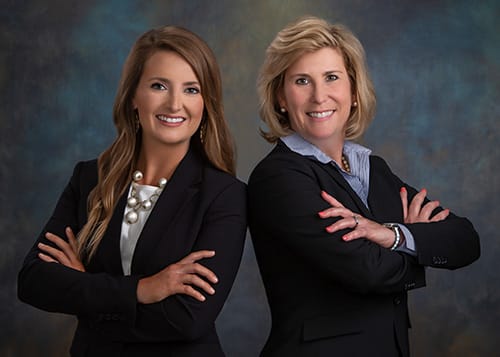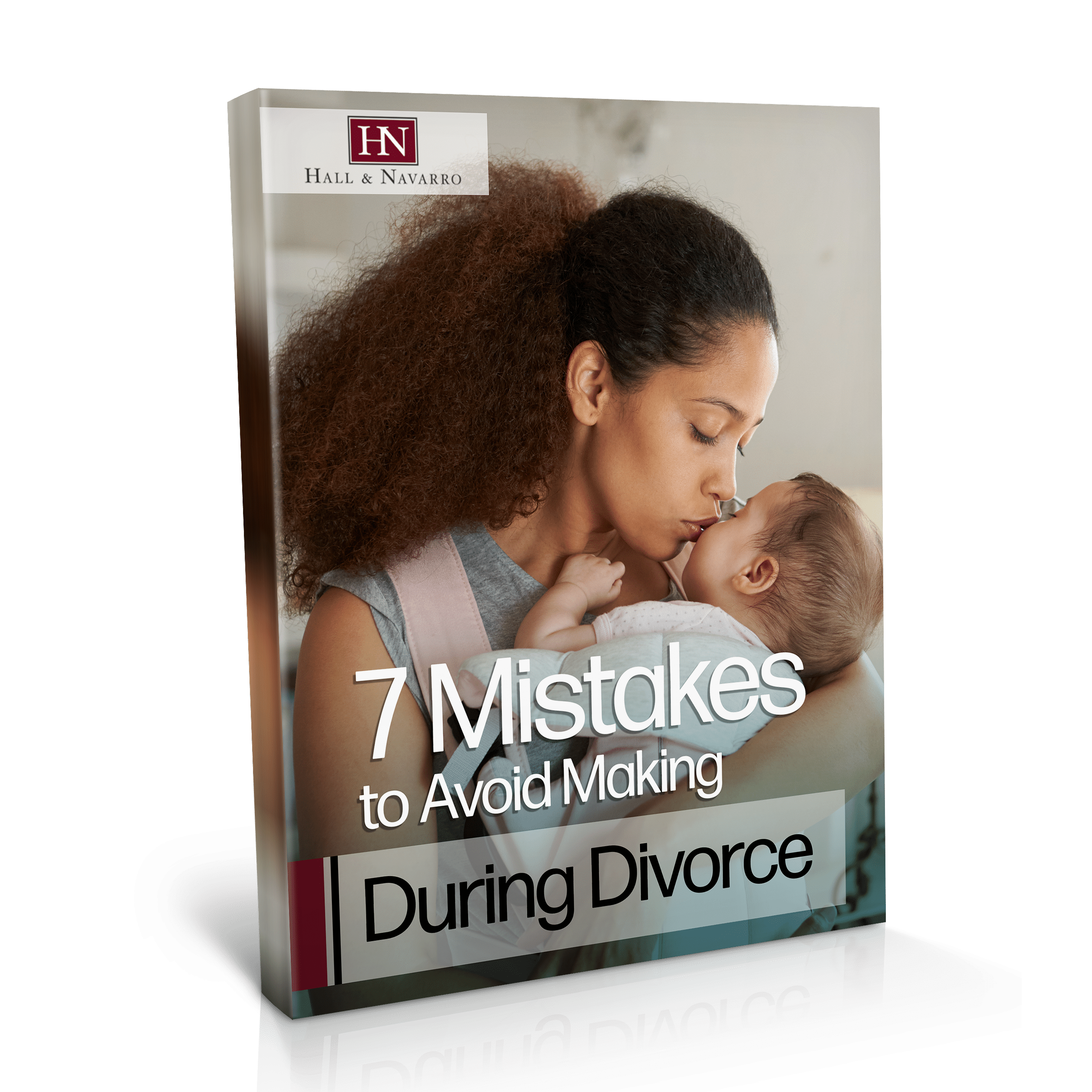Child Custody Lawyers
Georgia Child Custody Lawyers
Fearless representation
When you are splitting from your partner and you have children, custody is a huge concern. You may be worried about how everything will work out. You know that the court is going to do what is best for your child, but having one of our Georgia child custody lawyers in your corner will help make this easier on you in the long run.
Let our family handle your family’s needs. Call the Georgia family lawyers at Hall & Navarro today to get started.

Watch this video
Considering divorce?
Download our free guide.
There are 7 mistakes you should avoid making during a divorce.

Top Rated Family Lawyers in Georgia
Over 100 5-star reviews on google









How is Hall & Navarro different?
Prepared to Win
No matter what, we approach every case prepared to win. This has been our driving force from day one, and still carries us forward today.
Breadth of Experience
With more than 75 years of combined experience in a variety of practice areas, we are frontrunners of law in Southeast Georgia.
Fearless representation
We put everything forward, and take nothing back. We are a united front, rallying behind and in front of every client.
Types of custody in Georgia
First, note that Georgia is not going to make a call based on favoring either the mother or the father, in terms of giving custody to one over the other. Most people assume that mothers are favored, which is not true. The court is going to do what is best for the child or children. There are two forms of custody that the court will deliberate on:
- Physical custody
- Legal custody
Physical custody is exactly as it sounds. It is going to be the parent who physically has the child under their roof. Both parents can have physical custody shared, or it can be sole physical custody to one parent.
Legal custody is different in that it is mostly regarding decision making. If you have legal custody, you are responsible for making decisions about the child’s healthcare, religion, sports, education, etc.
The court will be able to grant custody in both regards either entirely to one parent or shared between the two. There are cases where one parent has primary custody and has the children visit with the other parent on a scheduled basis. They might go to their non-custodial parent’s on weekends. Or there are some cases where the children will go between two houses based on daily decisions made by the primary custodial parent.
Establishing Paternity
Before custody is done, paternity should be established, if it has not been already. There are a few ways paternity is established in Georgia:
- Who was married to the mother when the child was born
- For unmarried parents, they can sign a form that acknowledges the paternity of the parent
Why You Should Hire a Child Custody Lawyer
While it would be nice if both parties could come to their Georgia child custody lawyers with an agreement they have already discussed together, that is a best case scenario. If you cannot agree, the judge will decide it for you.
The judge will consider the following:
- How much the children have emotionally bonded with each parent and their siblings, if they have at all
- How well each parent knows what the child needs
- How capable each parent is to meet the needs of their children
- The living environment and safety of each parent
- How much each parent has been involved in the children’s lives
- What would be most stable for the child
Some circumstances that can sway the decision is if one parent has historically been abusive, if a parent has a history of drug use, or if a child over the age of 14 has a preference regarding with whom they would reside.
Schedule your consultation.
Speak with one of our dedicated team members by filling out the form below.
More Child Custody Info
Primary, joint, split, and sole custody
There are four ways custody can typically turn out:
- Primary custody
- Joint custody
- Split custody
- Sole custody
If you get primary custody, you are going to be the parent who has the child most of the time. That might mean you have them just over half the time, all the way up to 100% of the time.
If you get joint custody, you are going to share the physical custody with the other parent. There will likely be equal time spent with each parent.
If you end up with split custody, that is sometimes a scenario when there are two or more children you had with the other parent. One person may be the custodial parent for at least one of the children, while the other has custody of the other children.
If you get sole custody, you are the permanent custodial parent of the child as per the court order.
Do grandparents have custody rights?
In Georgia, grandparents do not automatically have visitation or custody rights. The only way that grandparents can get custody or visitation rights in Georgia is if you can show that the children’s parents are unfit.
A grandparent has a hard time doing that a lot of times because one of the children is their child. It would require filing an action in the court to establish visitation or custody rights for the grandparent. You would have to certify that the parents are unable to parent the child, and that it would be in the child’s best interest for visitation or custody to be established into the grandparent.
There are times where grandparents would have an easier time getting visitation rights with their grandchildren. For instance, if you were the paternal grandparent, meaning that your son is the father of this child, and your son passes away in a car accident. Unfortunately, your daughter-in-law is not going to allow you to visit the children anymore. If there are facts where the daughter-in-law is withholding the child, not allowing telephone contact, not allowing holiday time or even present exchanges, then the judge will likely grant visitation to that grandparent.
In that same scenario, if you wanted custody of your grandchildren, you would still have to say that your daughter-in-law is unfit or unable to have custody of those children. The court may grant you custody based on whatever evidence comes out.
With the right facts and circumstances, grandparents can be successful in obtaining custody or visitation of their grandchildren.
Moving out of Georgia During a Custody Case
In Georgia, if you can move and not get in the way of the other party’s parenting time, then the court will allow you to leave with your child(ren); however, if you are interfering with the other parent’s parenting time or their ability to exercise their parenting time, the court’s going to consider that to be a change of circumstance. Depending on your facts around how you moved and your reason for moving, the court could change custody to the other parent and not allow you to take the children to leave and live with you in another state.
It is complicated because there are lots of different factors in everybody’s cases. It may even come down to what judge you have. In Georgia, so long as the children are residing here, the court ultimately has the authority to decide what is in their best interest during a custody case.
If you’re planning on moving, what I would say is make sure you’re giving the other party prompt notice, and that you’re evaluating whether your move is going to affect the children and affect their time with the other parent. Bring those facts and circumstances into our office. Let us look at that. Let us look at your prior court orders and determine whether you would need court approval to move, or whether you’ve met your burden of alerting the other parent and there may be an agreement for you to move.
Oftentimes, if you are moving out of state, there’s going to be some changes to your prior paperwork. Even if everyone is on the same page about you moving, you would want to make sure that you file the appropriate court case just to get the judge’s approval on any new parenting time and child support obligations that may change. Any move is probably going to deem a change of circumstances to the extent that a court is going to want to look at that in the modification action just to be safe and make sure the children and their best interests are being looked after.
Children Choosing Which Parent to Live With
In Georgia, children do have the option to express their desires to the court if they want to live with one parent or the other. Now, there are different levels of how the court will handle that child’s intentions.
Ultimately, until a child reaches 11 years old, what they want and where they want to live is not something the court is going to ask them upfront. That’s not to say that children that are younger than 11 don’t have an opinion or aren’t happy at one house rather than the other, but the court is not going to expose them to having to choose between one parent and the other.
After the child has turned 11, however, that child may then have an opinion as to where they want to live. The court’s going to take that just as a factor; it’s going to be one of the many factors that are outlined under Georgia law. The court doesn’t have to do what that child wants.
When a child reaches 14 years old, however, they gain more power. The court now will defer to the child’s wishes, unless the other party can prove that child’s wishes are not in their best interest. For example, let’s say you have a 14-year-old who wants to go live with the other parent just because they know they can get away with anything. In that instance, we would need to prove that the other parent is not going to discipline the child, or had never been involved in their schooling or medical care.
Under Georgia law, there are specific age requirements that allow the child to have their voice heard more and more as they get older. However, with the right evidence to back up a younger child’s wishes, we can do a better job describing to the court why they want to live with one parent rather than the other. We’ve been successful in having children’s voices heard without actually putting them in front of the judge or in an open courtroom.
